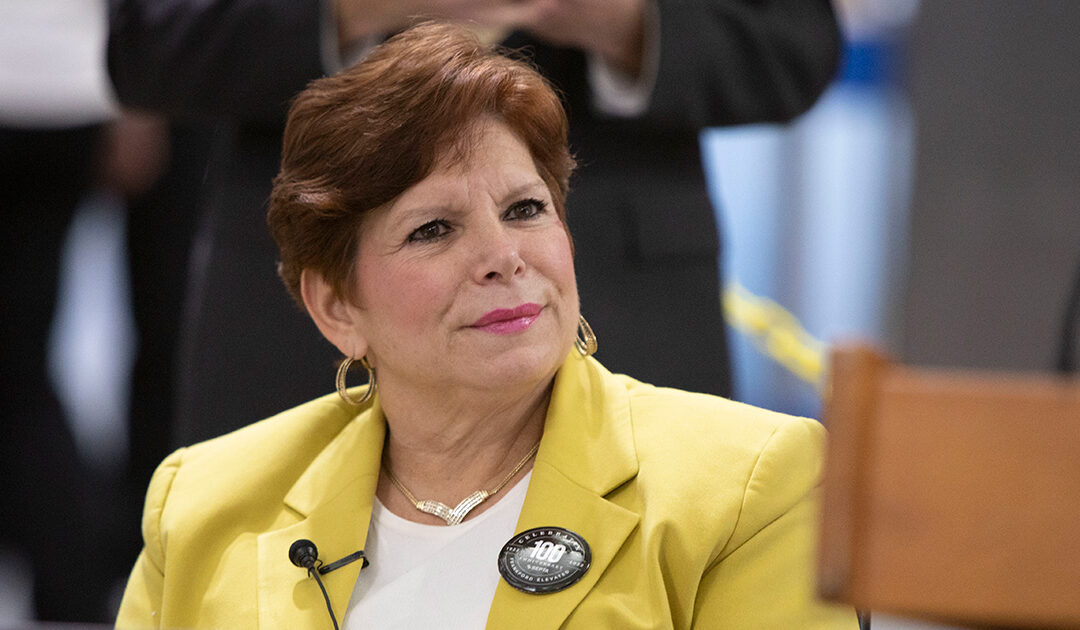
by Christin Brown | March 26, 2024 | feature, News Releases
Philadelphia, PA – March 26, 2024 – Today, Senator Christine Tartaglione announced that $1,550,000 in Multimodal Transportation Fund grants have been awarded to two projects in the 2nd Senatorial District to help create safer streetscapes and pedestrian infrastructure.
“Bringing these funds to the 2nd District will help fund two transformative projects to enhance urban mobility and community vibrancy,” said Senator Tartaglione. “These initiatives continue to show our prioritization and dedication to pedestrian safety and connectivity, reflecting our commitment to accessible and sustainable transportation infrastructure.”
The Multimodal Transportation Fund provides grants to encourage economic development and ensure that a safe and reliable transportation system is available in our Commonwealth. Funds may be used to develop, rehabilitate, and enhance transportation assets to existing communities, as well as streetscape, lighting, sidewalk enhancement, pedestrian safety, connectivity of transportation assets, and transit-oriented development.
The two projects in the 2nd District receiving funding are:
- Castor Avenue Streetscape Project – $1,300,000
- Frankford Creek Greenway Project – $250,000
More information on the Multimodal Transportation Fund and all other funding opportunities available through the Commonwealth Financing Authority and the Department of Community and Economic Development can be found online.
###

by Christin Brown | April 19, 2021 | News Releases
Philadelphia, PA – April 19, 2021 – State Senator Christine Tartaglione (D-Philadelphia) is pleased to announce that the Frankford Community Development Corporation (FCDC) is among 43 community organizations statewide that have been awarded grant funding under the COVID-19 Relief – Supporting Elm and Main (SEAM) program.
FCDC, of 4667 Paul St., Philadelphia, will receive $50,000 to help it replenish income it lost due to the pandemic and support its Elm Street initiative. In all, $2 million in SEAM grants were awarded through the Pennsylvania Department of Community and Economic Development (DCED).
“The Frankford CDC, under the leadership of Executive Director Kimberly Washington, has demonstrated a tremendous ability to foster economic growth and job creation in Lower Northeast Philadelphia while improving access to affordable housing and enhancing community spaces. Frankford needs the CDC. This funding will help sustain it through this very difficult period for us all,” Senator Tartaglione said.
“Frankford CDC is extremely grateful for an administration that recognizes the need to extend funding to small nonprofits who deliver services to vulnerable populations,” Executive Director Washington said. “This SEAM funding will ensure that Frankford CDC is able to continue to provide outreach and technical support to help sustain Frankford’s small businesses.
SEAM provides financial assistance to community revitalization organizations dedicated to community and economic development in older and historic downtowns, commercial districts, and neighborhoods. The Elm Street Program is a component of DCED’s Keystone Communities Program (KCP) focused on the revitalization of older residential areas bordering central business districts. Visit the DCED website for information about the SEAM program.
# # #
If you would like more information about this topic, please contact William Kenny at 215-533-0440 or William.Kenny@pasenate.com.

by Christin Brown | June 8, 2020 | News Releases
HARRISBURG – June 8, 2020 – Members of the Pennsylvania Senate Democratic Caucus announced the direction of $225 million in federal CARES Act funding to aid small businesses across the commonwealth. This funding was authorized by the recently enacted COVID-19 Emergency Supplement to the General Appropriation Act of 2019 and was a centerpiece of the caucus’ PA CARES Plan.
The aid will be distributed as follows: $100 million is set to go to the Main Street Business Revitalization Program, $100 million to the Historically Disadvantaged Business Revitalization Program, and $25 million for loan payment deferment and loss reserves for loans impacted by COVID-19. The aid will be directed by the Department of Community and Economic Development to Community Development Financial Institutions (CDFI), which are intimately familiar with the needs of the most vulnerable small businesses in our communities.
“I want to thank Governor Wolf for engaging leadership in the General Assembly to inform the process of moving federal aid out to those who have been most harmed by the COVID-19 pandemic. I also want to thank the leadership of the Senate Democratic caucus who worked with our members to formulate a strategic plan for the deployment of nearly $4 billion in federal assistance,” said state Senator John Blake (D-Lackawanna). “The Main Street Business Revitalization program is a reflection of that cooperation and leadership and it will meet Pennsylvania’s small business owners where they are, on Main Street, after nearly three months of lost or no sales. It will enable small business owners throughout the commonwealth to meet their insurance payments, rents, health insurance premiums, local taxes and other expenses that they otherwise could not meet due to lost sales. Finally, I want to thank the 17 CDFIs throughout the state as well as DCED for their professionalism, agility, urgency and dedication to getting this federal funding to the small businesses who need it most as quickly as possible.”
Eligible businesses will apply through one of the CDFI Network partners and will have to have been operating on or before February 15, 2020, and must have paid taxes to state and federal governments. Qualifying main street and historically disadvantaged small businesses must have 25 or fewer employees and experienced losses as a result of Gov. Tom Wolf’s March 19 stay-at-home order. Organizations seeking grants from the historically disadvantaged small businesses program must also be 51 percent owned and managed by socially and economically disadvantaged individuals.
“The announcement of the Main Street and Historically Disadvantaged Business Revitalization Programs will provide welcomed relief for mom and pop businesses in neighborhoods across the commonwealth,” said State Senator Vincent Hughes (D-Philadelphia/Montgomery). “Since this pandemic began, we have heard the needs of the auto body shops, the barbershops, the beauticians, the pizza shop owners, the soul food establishments and other businesses in our communities. The needs of these businesses that were unable to get much needed help from other state and federal programs were a priority in our Senate Democratic Caucus’ April 29 PA CARES Program announcement. For months, my office has worked with a network of trusted community organizations that have a proven track record of working with our small CDFIs to find a solution to assist our neighborhood businesses. I believe these programs are that solution. There is still more work to be done, but these programs are a win for Pennsylvania and its small businesses.”
Businesses will be eligible for up to $50,000 in grants. Grants can be used to cover operating expenses during the shutdown and in the transition period to reopening, technical assistance and training, debt payment relief for CDFI borrowers and loan loss reserves.
“Our small businesses all across the state made sacrifices so that we could flatten the curve of COVID-19 and save lives,” said Senate Democratic Leader Jay Costa, Jr. “Now as we begin to recover, our businesses will need and deserve assistance to reopen their doors, rehire their staff and serve our communities again. We thank them for their patience through this difficult time, and are ready to offer the programs, loans and assistance they need.”
Businesses will be required to submit proposals for review documenting sales losses, projected revenues, the duration of closure as a result of COVID-19, and relief receipts for other federal, state and local government aid. Eligible businesses will apply directly through a local CDFI.
“One of the goals of the pandemic-recovery stimulus plan that I offered in March, was to jump-start business operations and speed the economic recovery by making resources readily available to get more men and women back to work quicker,” Brewster said. “Using federal CARE dollars to bolster business and smooth the back-to-work transition is critically important. The caucus CARES initiative includes one piece of the plan and will be especially useful to small businesses as they cover expenses and manage start-up costs. Plus, it will usher in help for small businesses who may not have been able to access other state or federal business assistance programs.”
Distributed funds will be monitored by DCED to track the total number of grants awarded under these programs including county, the number of jobs saved by the grants, the total amount of loan payment and deferment, administrative costs and more.
“Thank you to Governor Wolf and his administration for recognizing the need for our Main Street Business Revitalization Program and incorporating that proposal into the Commonwealth’s plan to support our small businesses, which represent nearly half of the private sector workforce in Pennsylvania – 2.5 million jobs,” said Senator Iovino (D-Allegheny/Washington). “Small businesses are the job creators in our communities, the revenue generators for our Commonwealth, and the cornerstone of vibrant main streets. As small business owners are struggling to hang on, this $225 million grant package is exactly the kind of lifeline that these economic drivers need to support our recovery.”
For more about the caucus’ comprehensive, people-focused COVID-19 recovery plan, visit pasenate.com/pacares.



